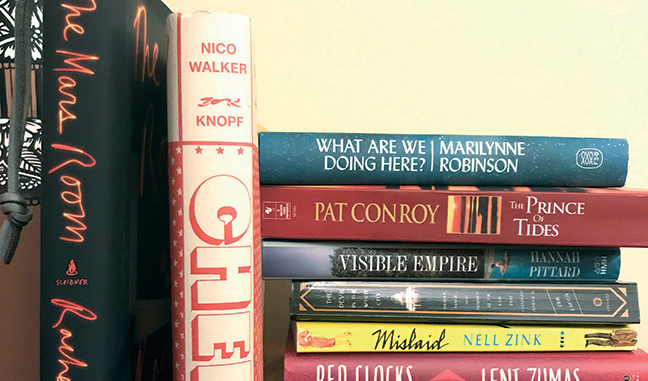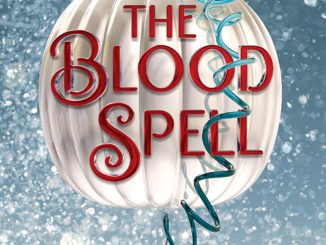
I’ve been hard-pressed to find a book that grabbed me like Red Clocks did, and despite my hopes of finding Alissa Nutting’s Unclean Jobs for Women and Girls under my parent’s tree, it did not appear. I think the title freaked my mom out (I still give her a Christmas wish list, although, millenial that I am, it’s online), so she got me earrings instead.
As usual, I’ve jumped around in my reading selections of late. I started Rachel Kushner’s The Mars Room right after reading Nico Walker’s Cherry. I know, I’ve been reading a lot of super upbeat, holiday-type books, right? Somehow, and it might be because I’m a creep and found out that Nico Walker wrote his entire book from prison, the last three books I’ve read either have implicit or explicit prison settings/themes. I say Cherry’s is implicit, because Walker wrote the book in such a way that the main character always seems to be on the brink of getting caught – in fact, the tale is told in reverse, with the main character on the brink of getting caught pretty early on and circling back to tell his story. Walker’s writing style is quick and alert and aware and full of nervous energy, much like his main character. You feel for the guy, even though he’s a complete mess. The narrator feels like he’s an impostor in his own life and in America, even after – and maybe especially after – he serves in the Army. As an 18 year old, the narrator is a privileged kid from Ohio who takes every opportunity for granted. He’s listless, but not necessarily lazy. This is another book that’s all about voice paired with scene and intense, distinct descriptions of people and places you’ll likely never experience or visit yourself. Unless you’ve been in combat in Afghanistan or bought illicit substances in a McDonald’s parking lot or robbed a dozen banks. Walker shows a conflicted, confused man who’s making it up as he goes, writing his fate down as it becomes more clear that the only way he’s going to straighten up is, well, by getting caught. If you think you’ll pick this one up, beware: he, uh, uses a LOT of colorful language.
Rachel Kushner’s The Mars Room isn’t disappointing so much as it is just kind of difficult to get through. Being that it is about a mother who kills her stalker and gets sentenced to life in prison and may never see her young song again, it’s pretty dang sad and hopeless. Despite the fitful subject matter, the writing grabs you from page one, to use a terrible writing critique cliché. The main character is kind of terrible but so is everyone else and they’re all just trying to survive in an equally terrible environment. Mars Room brings in issues of class and stereotypes and single mothers in poverty and how the prison/court system sort of fails in a lot of ways, no matter your race or societal standing or anything else. You can tell Kushner did her research and knows her characters and is trying to shed some light on a dark subject. The main character is trapped in prison, yes, but she has been trapped for years: She is a single parent who can’t find a good job and has fallen in with sketchy people for as long as she can remember, largely due to geography, which she can’t afford to change. It presents women in varying stages of vicious cycles they are at once trying to break while being ensnared, which is maddening for you as the reader because it elicits empathy but you also feel a sense that justice has been served since the women in the book have all done awful things. Anyway, The Mars Room is sitting on my windowsill, staring at me every time I grab socks or a shirt from my dresser. I’ve got maybe 50 pages left. I’m determined to finish it, but being that it was the second prison-novel I’d started in a two month time-span, my reading life was getting pretty bleak, so I thought I’d step away and try something more upbeat.
I was wrong. Ironically, the other book I started reading, which I was supposed to get through for work (not personal preference) also involves incarceration. Lucky me. Tayari Jones’ An American Marriage landed in my hands early-December, with a deadline to finish by January 14. The book’s accolades are many, one of which is stamped on its cover – Oprah Book Club pick. This list, comprised of classics and new releases, is extensive – 80 titles! Lot of familiar names like Toni Morrison, William Faulkner, Colson Whitehead, Steinbeck, Tolstoy, Kingsolver. It seems the endorsement is a big deal; it’s Oprah, after all, and you know how I trust recognizable names to tell me what to read (although I’ve never leaned on celebrity to give me a book suggestion).
Given that I DO NOT allow myself to read the book jacket, and had done no research on the title, I had no context when I cracked it open. A far cry from the literary fiction I’m used to, Jones employs quite a few narrative styles within a rather simple, yet delicate, plot that I thought would go a lot deeper than it did. There’s just so much that doesn’t make sense in this book, literally and figuratively. I can see why it’s a book club pick in that it has the potential to bring up some social/political/cultural subjects that we could all stand to spend a little more time talking and thinking about, perhaps in a group setting that offers varying perspectives on said subjects. But reading it alone, I kept finding inconsistencies in the characters and style and plot that I couldn’t excuse. I’m a stickler for scene-work and action and rich, descriptive detail, so this book wasn’t for me, stylistically speaking.
I am already looking forward to reading a book that has no mention of prison in its pages. Although I thought I wanted to read Mesha Maren’s Sugar Run, since it too has shown up on every “to be read” list for 2019. Turns out, the narrator is sentenced to life in prison at 17 years old. I think I’ll skip it for now.
-by Sara Volpi





